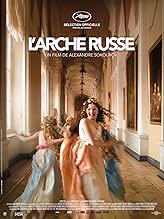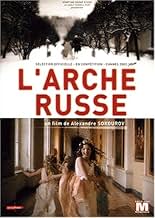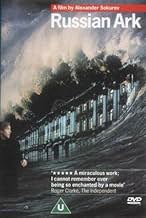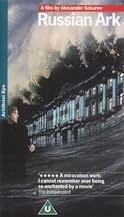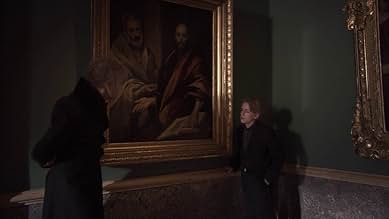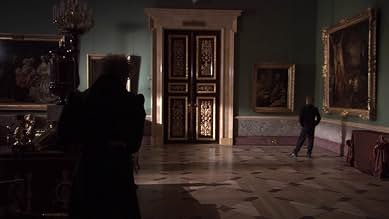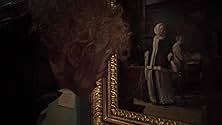AVALIAÇÃO DA IMDb
7,2/10
22 mil
SUA AVALIAÇÃO
Um aristocrata francês do século XIX, conhecido por suas memórias contundentes da vida na Rússia, viaja pelo Museu Hermitage da Rússia e encontra figuras históricas dos últimos 200 anos.Um aristocrata francês do século XIX, conhecido por suas memórias contundentes da vida na Rússia, viaja pelo Museu Hermitage da Rússia e encontra figuras históricas dos últimos 200 anos.Um aristocrata francês do século XIX, conhecido por suas memórias contundentes da vida na Rússia, viaja pelo Museu Hermitage da Rússia e encontra figuras históricas dos últimos 200 anos.
- Direção
- Roteiristas
- Artistas
- Prêmios
- 10 vitórias e 15 indicações no total
Avaliações em destaque
I found "Russian Ark" a fascinating work of a very ambitious director. For me, it was a highly enjoyable guided tour through the rooms, galleries, and halls of one of the greatest museums in the world. I have not been to Hermitage (Winter Palace) for over fourteen years, and to see the familiar rooms, stairs, paintings, and sculptures was like traveling back in time. The film is also the journey over three hundred years of the Russian history and the attempt to understand the country's place and meaning in European culture. Each of the palace's rooms is filled with memories, shadows, whispers, smiles, and tears of the people whose lives have made the history of the country. The fact that it is all presented in a single, the longest uninterrupted shot ever makes it even more incredible. I also saw the documentary about making "Russian Ark". It is called "On One Breath" - that's how the director, Alexander Sokurov wanted his audience to feel about the film that was shot in a single glorious take during several hours on one winter night. The preparation for this unforgettable night took almost four years.
This documentary-type movie, done all in one long, unbroken take with a steadicam, has the camera basically hovering around a famous Russian museum for an hour and-a-half as the unseen film director (both by us and the others in the museum) makes comments, as if in a dream, and converses with a French, former diplomat from the 1800s. It's a mix of a museum tour, Russian history, and performance art -- Catherine the Great appears at one point, desperately looking for the toilet. I liked it because it's about the closest thing to a dreamstate you can get in film, something like the long tracking shots in Tarkovsky's movies; I didn't get a lot of the references to Russian historical figures, but it doesn't really matter. However, if you know Russian history, you may get extra enjoyment out of it and might latch onto the sarcastic bits better than I did. I think this is a real achievement; a perfect example of how style is substance. 9/10
Sokurov breaks boundaries with his dreamlike vision of the Hermitage in St. Petersburg. It's the first feature-length narrative film shot in a single take (on digital video, using a specially designed disc instead of tape). "Russian Ark" is shot from the point-of-view of an unseen narrator, as he explores the museum and travels through Russian history. The audience sees through his eyes as he witnesses Peter the Great (Maksim Sergeyev) abusing one of his generals; Catherine the Great (Maria Kuznetsova) desperately searching for a bathroom; and, in the grand finale, the sumptuous Great Royal Ball of 1913. The narrator is eventually joined by a sarcastic and eccentric 19th century French Marquis (Sergey Dreiden), who travels with him throughout the huge grounds, encountering various historical figures and viewing the legendary artworks on display. While the narrator only interacts with the Marquis (he seems to be invisible to all the other inhabitants), the Marquis occasionally interacts with visitors and former residents of the museum.
The film was obviously shot in one day, but the cast and crew rehearsed for months to time their movements precisely with the flow of the camera while capturing the complex narrative, with elaborate costumes from different periods, and several trips out to the exterior of the museum. Tillman Buttner, the director of photography, was responsible for capturing it all in one single Steadicam shot. "Russian Ark" is an amazing accomplishment, and clearly made with passion, but while the film is sure to be hailed as a masterpiece by some, its narrative conceit isn't nearly as interesting as the technical feat of its creation. The result is a unique and intelligent film with sporadic moments of transcendent beauty that fails to create a strong emotional connection with its audience. It's essentially a 96-minute museum tour, with the added benefit of time travel and wax figures that briefly come to life.
But wax figures are all they are, essentially. Sokurov, as though following a hasty guide, spends so little time with the historical figures he portrays that it often feels as though he's moving on just as you begin to figure out who and what you're watching. The Russian experience of World War II, for example, is portrayed with a brief stop in a foreboding, ghostly room filled with coffins. The filmmaker is known for his lugubrious pacing, but Russian Ark has the odd distinction of seeming both slow paced and rushed. It moves slowly and mournfully, but still only glances across the surface of the eras it portrays. It's a demanding film, encompassing a wealth of Russian history and art history between its first and final frames. Those who stay with it will be rewarded in the end by a gorgeously mounted ball, in which the camera gracefully slides among elaborately costumed dancers as the orchestra plays. It's a deeply felt irony that this transcendent moment of joy takes place on the eve of the Russian revolution, and the world of these briefly glimpsed characters is about to come crashing to an end. It's a shame that the film has few moments where form and content align so powerfully
The film was obviously shot in one day, but the cast and crew rehearsed for months to time their movements precisely with the flow of the camera while capturing the complex narrative, with elaborate costumes from different periods, and several trips out to the exterior of the museum. Tillman Buttner, the director of photography, was responsible for capturing it all in one single Steadicam shot. "Russian Ark" is an amazing accomplishment, and clearly made with passion, but while the film is sure to be hailed as a masterpiece by some, its narrative conceit isn't nearly as interesting as the technical feat of its creation. The result is a unique and intelligent film with sporadic moments of transcendent beauty that fails to create a strong emotional connection with its audience. It's essentially a 96-minute museum tour, with the added benefit of time travel and wax figures that briefly come to life.
But wax figures are all they are, essentially. Sokurov, as though following a hasty guide, spends so little time with the historical figures he portrays that it often feels as though he's moving on just as you begin to figure out who and what you're watching. The Russian experience of World War II, for example, is portrayed with a brief stop in a foreboding, ghostly room filled with coffins. The filmmaker is known for his lugubrious pacing, but Russian Ark has the odd distinction of seeming both slow paced and rushed. It moves slowly and mournfully, but still only glances across the surface of the eras it portrays. It's a demanding film, encompassing a wealth of Russian history and art history between its first and final frames. Those who stay with it will be rewarded in the end by a gorgeously mounted ball, in which the camera gracefully slides among elaborately costumed dancers as the orchestra plays. It's a deeply felt irony that this transcendent moment of joy takes place on the eve of the Russian revolution, and the world of these briefly glimpsed characters is about to come crashing to an end. It's a shame that the film has few moments where form and content align so powerfully
A 90-minute movie centered on St. Petersburg's Hermitage Museum, filmed in one unbroken take by a digital steadicam, didn't send a lot of Americans racing to buy tickets when it was shown here two or three years ago. The movie, however, is far more than just a technical stunt. It's a unique tour de force with emotional impact.
Russian Ark portrays the Hermitage as a kind of cultural and historical ark floating on centuries of Russian seas. The narrative device is a shadowy eighteenth century Frenchman who wanders the halls and time periods, commenting often with good-natured European condescension on what he sees. He is accompanied by a Russian who is never seen, and who questions him about his comments. The movie ranges through time with appearances of Peter the Great, Catherine II, Pushkin, Nicholas II and his family, generals, maids, flunkies and diplomats. The Frenchman, played with great style by Russian actor Sergei Dreiden, takes us to painting and sculpture galleries, kitchens, ballrooms, storerooms, basements and living quarters as we observe things that happened in the Hermitage over the centuries.
At first, I was very aware of the technical feat of no cuts. Gradually, though, I think most people just relax and accept the skill of the director and photographer, and become immersed in what they are seeing. A kind of unreal imagery takes hold. The movie ends with the last dance held in the Great Ballroom before WWI. Hundreds of actors and dancers, in full costume, swirl around this ornate setting, and swirl around the camera as well, while the camera glides through the crowds. It's a terrific scene, and is followed by the end of the dance with all the hundreds of guests making their way through the halls and staircases to leave the building, with the camera facing them and moving along in front of them.
This is a highly unusual film, probably a great one.
Russian Ark portrays the Hermitage as a kind of cultural and historical ark floating on centuries of Russian seas. The narrative device is a shadowy eighteenth century Frenchman who wanders the halls and time periods, commenting often with good-natured European condescension on what he sees. He is accompanied by a Russian who is never seen, and who questions him about his comments. The movie ranges through time with appearances of Peter the Great, Catherine II, Pushkin, Nicholas II and his family, generals, maids, flunkies and diplomats. The Frenchman, played with great style by Russian actor Sergei Dreiden, takes us to painting and sculpture galleries, kitchens, ballrooms, storerooms, basements and living quarters as we observe things that happened in the Hermitage over the centuries.
At first, I was very aware of the technical feat of no cuts. Gradually, though, I think most people just relax and accept the skill of the director and photographer, and become immersed in what they are seeing. A kind of unreal imagery takes hold. The movie ends with the last dance held in the Great Ballroom before WWI. Hundreds of actors and dancers, in full costume, swirl around this ornate setting, and swirl around the camera as well, while the camera glides through the crowds. It's a terrific scene, and is followed by the end of the dance with all the hundreds of guests making their way through the halls and staircases to leave the building, with the camera facing them and moving along in front of them.
This is a highly unusual film, probably a great one.
Focusing on three centuries of Russian history from Peter the Great to Tsar Nicholas II, Russian Ark, the latest film by Alexander Sokurov, is an amazing tour de force. Shot in one long 96-minute tracking shot with a cast of 2000 actors and extras, the film takes the viewer into the great Hermitage Collection in St. Petersburg, Russia, showing real works of art from 33 rooms and exploring their meaning in a larger context. More than just a great technical achievement, this is also a sublime meditation on the individual's place in the universe, one that does not recreate history but allows us to revisit it on a dreamlike stage where past, present, and future are one.
The film begins in the dark with the narrator (apparently Sokurov) commenting about how little he sees. "My eyes are open", he says, "and yet I see nothing". He does not know where he is but apparently has just died in an accident of some kind. Is this a movie? A play?" he asks. He receives no answer except a vision of 18th century aristocrats moving slowly into the Tsar's palace. An elegant white-haired man in a black cloak (Sergey Dreiden) suddenly appears and escorts the confused narrator into the corridors of the grand palace. "Everyone knows the present, but who can remember the past", says the stranger as they walk from one ballroom to the next, witnessing great works of art as well as ghost-like presences from Russia's past. We see works by El Greco, Rubens and Van Dyck in their awesome splendor. We run into Peter the Great thrashing a general, Catherine the Great looking for the bathroom, and Nicholas II, the last Russian Tsar hosting the Great Royal Ball of 1913, the last such formal occasion of its kind.
As we enter the Great Nicholas Hall, the opulent room is filled with thousands of aristocrats dancing the mazurka in gorgeous period costumes. A full orchestra is playing in the background and young soldiers are nattily dressed in their uniforms. How beautiful it all seems and how it appears they were destined to live forever but we all know how the nasty Bolsheviki spoiled the party. Ah yes, how green was my valley then. Sokurov said he wanted to make a whole film "in one breath" and he has succeeded in simulating the breathing process, pulling us in, then moving us out as we feel the rhythm of our own life beating with the swirl of lost humanity. At the end of Russian Ark, we see the peaceful flow of a river outside the hall to which the narrator comments, "The flow is forever. Life is forever." Having completed the past, our invisible guide is now ready to move into the endless silence that is, in the phrase of the Anglican priest Thomas Kelly, "the source of all sound".
The film begins in the dark with the narrator (apparently Sokurov) commenting about how little he sees. "My eyes are open", he says, "and yet I see nothing". He does not know where he is but apparently has just died in an accident of some kind. Is this a movie? A play?" he asks. He receives no answer except a vision of 18th century aristocrats moving slowly into the Tsar's palace. An elegant white-haired man in a black cloak (Sergey Dreiden) suddenly appears and escorts the confused narrator into the corridors of the grand palace. "Everyone knows the present, but who can remember the past", says the stranger as they walk from one ballroom to the next, witnessing great works of art as well as ghost-like presences from Russia's past. We see works by El Greco, Rubens and Van Dyck in their awesome splendor. We run into Peter the Great thrashing a general, Catherine the Great looking for the bathroom, and Nicholas II, the last Russian Tsar hosting the Great Royal Ball of 1913, the last such formal occasion of its kind.
As we enter the Great Nicholas Hall, the opulent room is filled with thousands of aristocrats dancing the mazurka in gorgeous period costumes. A full orchestra is playing in the background and young soldiers are nattily dressed in their uniforms. How beautiful it all seems and how it appears they were destined to live forever but we all know how the nasty Bolsheviki spoiled the party. Ah yes, how green was my valley then. Sokurov said he wanted to make a whole film "in one breath" and he has succeeded in simulating the breathing process, pulling us in, then moving us out as we feel the rhythm of our own life beating with the swirl of lost humanity. At the end of Russian Ark, we see the peaceful flow of a river outside the hall to which the narrator comments, "The flow is forever. Life is forever." Having completed the past, our invisible guide is now ready to move into the endless silence that is, in the phrase of the Anglican priest Thomas Kelly, "the source of all sound".
Você sabia?
- CuriosidadesShot in a single take. The first three attempts were cut short by technical difficulties, but the fourth was successful.
- Erros de gravaçãoMany extras look to the camera and they quickly return to a default mark.
- Citações
The Time Traveller: Sir. Sir. A pity you're not here with me. You would understand everything. Look. The sea is all around. And we are destined to sail forever, to live forever.
- ConexõesEdited into Spisok korabley (2008)
- Trilhas sonorasMazurka
(from opera "A Life For The Tsar")
Music by Mikhail Glinka
Performed by Mariinsky Theatre Orchestra
Conducted by Valery Gergiev
Principais escolhas
Faça login para avaliar e ver a lista de recomendações personalizadas
- How long is Russian Ark?Fornecido pela Alexa
Detalhes
- Data de lançamento
- Países de origem
- Idiomas
- Também conhecido como
- Russian Ark
- Locações de filme
- Empresas de produção
- Consulte mais créditos da empresa na IMDbPro
Bilheteria
- Faturamento bruto nos EUA e Canadá
- US$ 3.048.997
- Fim de semana de estreia nos EUA e Canadá
- US$ 29.022
- 15 de dez. de 2002
- Faturamento bruto mundial
- US$ 8.691.860
- Tempo de duração1 hora 39 minutos
- Cor
- Mixagem de som
- Proporção
- 1.78 : 1
Contribua para esta página
Sugerir uma alteração ou adicionar conteúdo ausente







